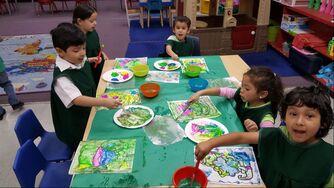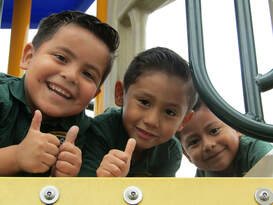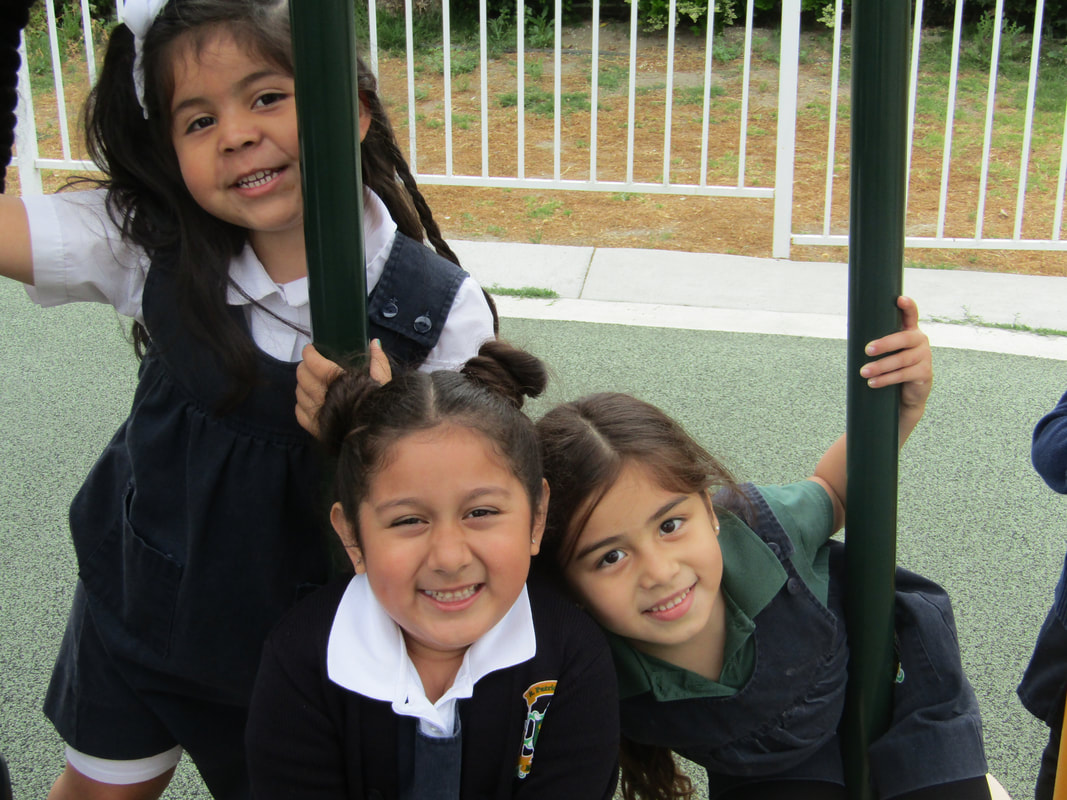PRESCHOOL
Spanish Immersion Preschool Information

We are a licensed preschool/prekindergarten in the state of California.
PS-2.5-3 years old
PK- turning 4 after September 1st
Reggio Emilia Inspired
90:10 Catholic Dual Language Immersion Model
All children must be potty trained.
Schedule:
Regular day 7:45-3pm
Extended day 7am-6pm
PS-2.5-3 years old
PK- turning 4 after September 1st
Reggio Emilia Inspired
90:10 Catholic Dual Language Immersion Model
All children must be potty trained.
Schedule:
Regular day 7:45-3pm
Extended day 7am-6pm
|
Here at Saint Patrick School we treasure each child's experience. Students spend 90% the day learning in Spanish and 10% the day learning in English. By learning two languages, our students will also develop communication skills, empathy, cultural understanding, and acceptance in order to change their world for the better. We look forward to sharing the success of our school with the Community!
Saint Patrick Preschool provides a nurturing, diverse environment where children can develop socially, emotionally, cognitively and physically. We strive to to enhance the development of social skills, relationships, respect for others and oneself, self-help skills, autonomy, peaceful conflict resolution and the empowerment of one’s own ideas. We see children as competent learners, capable of engaging with ideas and the world around them. Most importantly, we believe that it is essential to create an atmosphere of trust and safety where children will strive to become independent critical thinkers who feel free to explore their environment confidently. |
About Spanish Language Immersion

In our Preschool Spanish Immersion program, teachers will speak to children completely in Spanish so as to create an “immersion” experience. Teachers will use gestures, actions, pictures images, point and model so that students understand what she is saying. This method in teaching is called comprehensible input and helps children understand the context of what is being spoken.
Routines are also a big part of the immersion experience. After a couple of weeks, students will begin to identify patterns and know what to expect and therefore their comprehension of the language will increase. For example, they may not understand the phrase “sentémonos en un circulo.” However, after the third or four day, when the teacher uses this phrase and she sits down for circle time and two or three other students do the same, the students realize, that phrase means “let’s sit down for circle time.” Just like students begin to understand this routine by the teacher’s actions and then begin to associate the words and phrases, so will students being to understand the other routines like when it’s time to wash our hands, eat snack, and prepare their cot to take a nap.
FREQUENTLY ASKED QUESTIONS:
Is it too early or late for my child to be immersed in a new language?
Research actually states that learning languages around age three is actually an ideal time. At this time a child's brain is actually twice as active as an adult's, they have an increased ability to learn language. Language acquired early is a language acquired for life.
How soon will my child be speaking Spanish?
Language development is a process. Some students will come home excited and show you they know how to count in Spanish, while others might not want to share what they are learning or it might take them several weeks or months to pronounce one word. This is completely normal, learning a language happens over time. Research states that it can take anywhere from 5-10 years to become fully bilingual. The important thing to remember is that learning a language sooner rather than later is better for children.
How can you, the parent, help?
Parents your support is vital and encouraged. You can begin to talk to your child today and everyday before their immersion experience and tell them what they will experience. Explain to them that they will be learning Spanish and that the teacher will speak to them only in Spanish (unless it’s a complete emergency or they are very upset and must be comforted). Let them know that they are growing their brain and that you believe in them. Encourage them to take on this challenge and remind them that it might be difficult, but they should look at the teachers’ gestures, motions, and actions. They can also always look to their classmates to make sure they are on track with the instructions given. Reading and conversing with your children, in any language, will help them develop as linguistic skill as well.
Routines are also a big part of the immersion experience. After a couple of weeks, students will begin to identify patterns and know what to expect and therefore their comprehension of the language will increase. For example, they may not understand the phrase “sentémonos en un circulo.” However, after the third or four day, when the teacher uses this phrase and she sits down for circle time and two or three other students do the same, the students realize, that phrase means “let’s sit down for circle time.” Just like students begin to understand this routine by the teacher’s actions and then begin to associate the words and phrases, so will students being to understand the other routines like when it’s time to wash our hands, eat snack, and prepare their cot to take a nap.
FREQUENTLY ASKED QUESTIONS:
Is it too early or late for my child to be immersed in a new language?
Research actually states that learning languages around age three is actually an ideal time. At this time a child's brain is actually twice as active as an adult's, they have an increased ability to learn language. Language acquired early is a language acquired for life.
How soon will my child be speaking Spanish?
Language development is a process. Some students will come home excited and show you they know how to count in Spanish, while others might not want to share what they are learning or it might take them several weeks or months to pronounce one word. This is completely normal, learning a language happens over time. Research states that it can take anywhere from 5-10 years to become fully bilingual. The important thing to remember is that learning a language sooner rather than later is better for children.
How can you, the parent, help?
Parents your support is vital and encouraged. You can begin to talk to your child today and everyday before their immersion experience and tell them what they will experience. Explain to them that they will be learning Spanish and that the teacher will speak to them only in Spanish (unless it’s a complete emergency or they are very upset and must be comforted). Let them know that they are growing their brain and that you believe in them. Encourage them to take on this challenge and remind them that it might be difficult, but they should look at the teachers’ gestures, motions, and actions. They can also always look to their classmates to make sure they are on track with the instructions given. Reading and conversing with your children, in any language, will help them develop as linguistic skill as well.
Saint Patrick School
North Hollywood's Dual Language Immersion Catholic School
Preschool - Elementary School - Middle
Preschool - Elementary School - Middle


